UK College of Business Leading Change: Leadership Approaches Report
VerifiedAdded on 2023/01/20
|11
|899
|92
Report
AI Summary
This report delves into the concept of leading change, defining it as a framework for driving effective and sustainable changes within businesses. The report examines various leadership approaches, including Authoritarian/Autocratic, Participative/Democratic, and Delegative/Laissez-faire styles, and their application within organizations, specifically using Unilever as a case study. It analyzes the effectiveness of each approach in managing change, highlighting the advantages and disadvantages of each style. The report concludes by summarizing the importance of selecting appropriate leadership approaches to successfully navigate and implement organizational changes. The report also emphasizes the significance of employee involvement and the leader's role in communicating changes effectively.
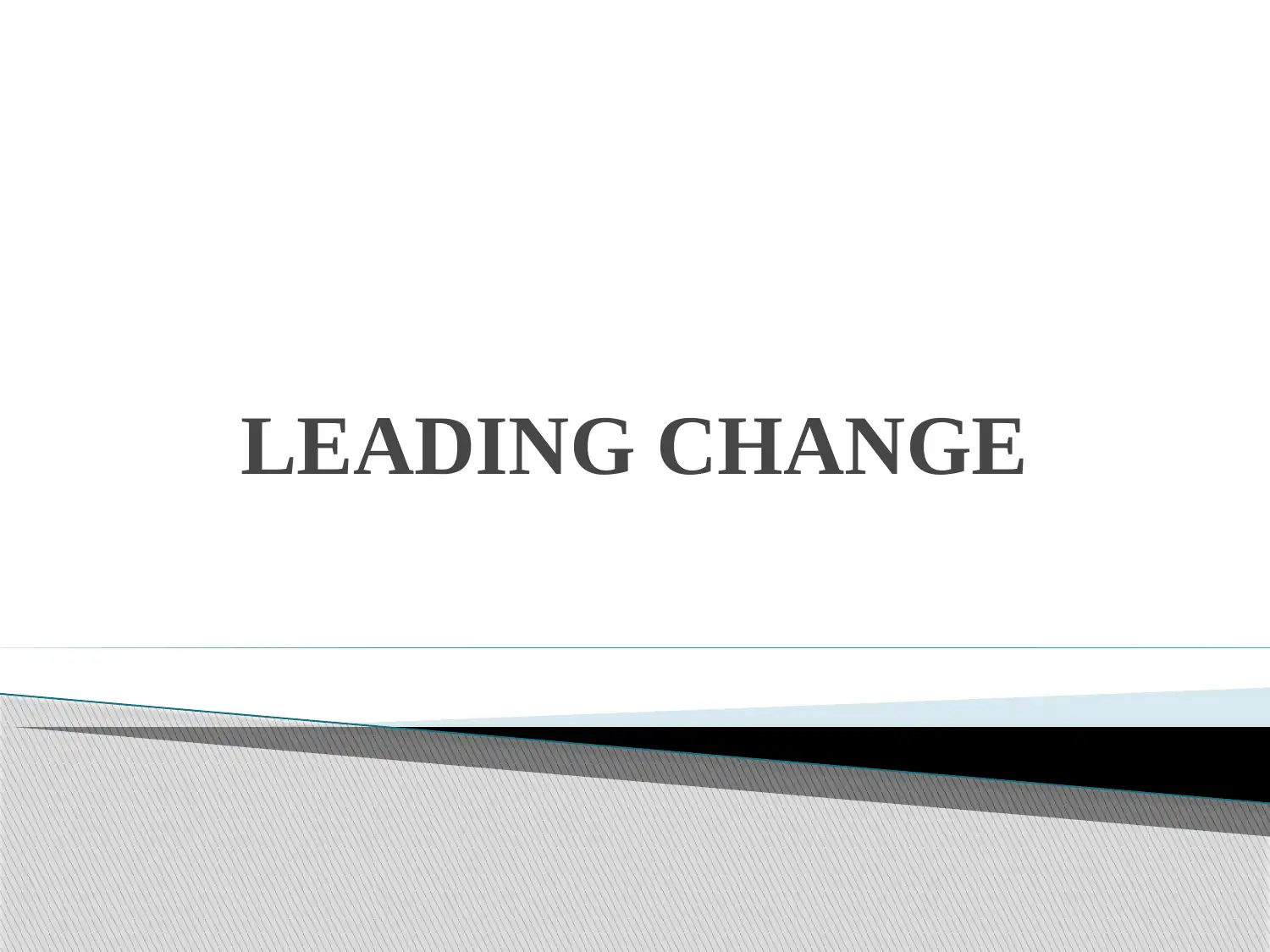
LEADING CHANGE
Paraphrase This Document
Need a fresh take? Get an instant paraphrase of this document with our AI Paraphraser
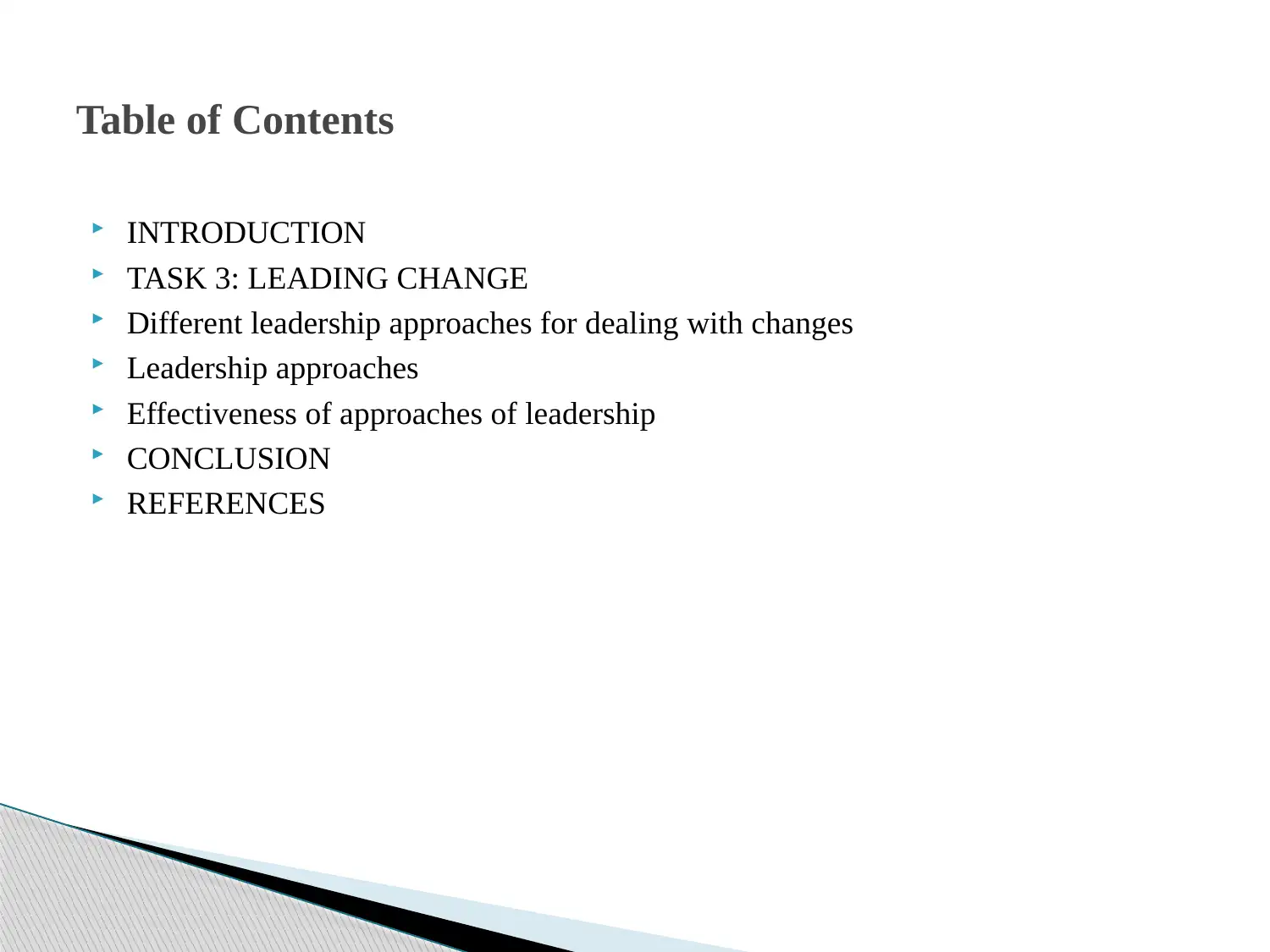
INTRODUCTION
TASK 3: LEADING CHANGE
Different leadership approaches for dealing with changes
Leadership approaches
Effectiveness of approaches of leadership
CONCLUSION
REFERENCES
Table of Contents
TASK 3: LEADING CHANGE
Different leadership approaches for dealing with changes
Leadership approaches
Effectiveness of approaches of leadership
CONCLUSION
REFERENCES
Table of Contents
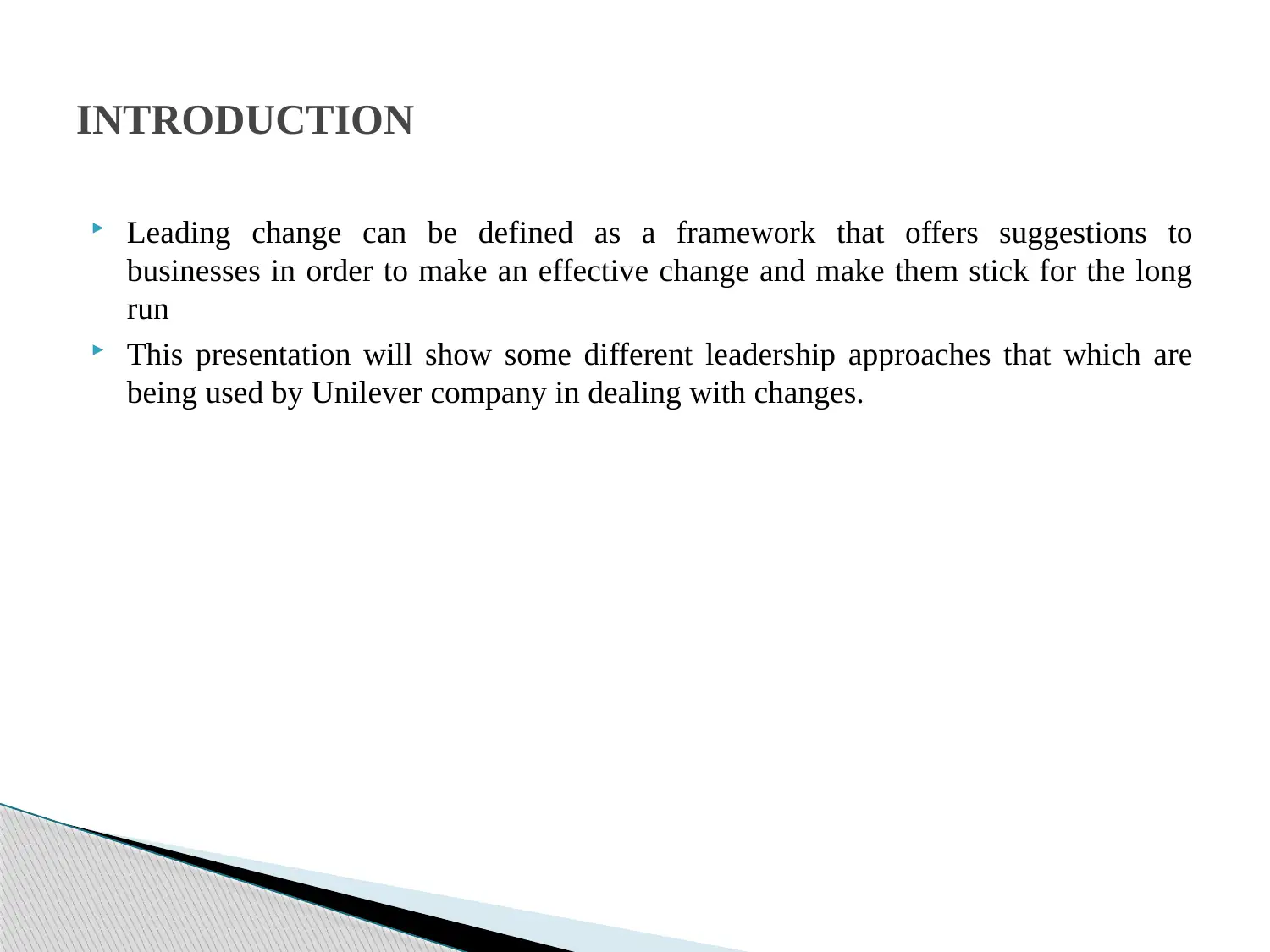
Leading change can be defined as a framework that offers suggestions to
businesses in order to make an effective change and make them stick for the long
run
This presentation will show some different leadership approaches that which are
being used by Unilever company in dealing with changes.
INTRODUCTION
businesses in order to make an effective change and make them stick for the long
run
This presentation will show some different leadership approaches that which are
being used by Unilever company in dealing with changes.
INTRODUCTION
⊘ This is a preview!⊘
Do you want full access?
Subscribe today to unlock all pages.

Trusted by 1+ million students worldwide
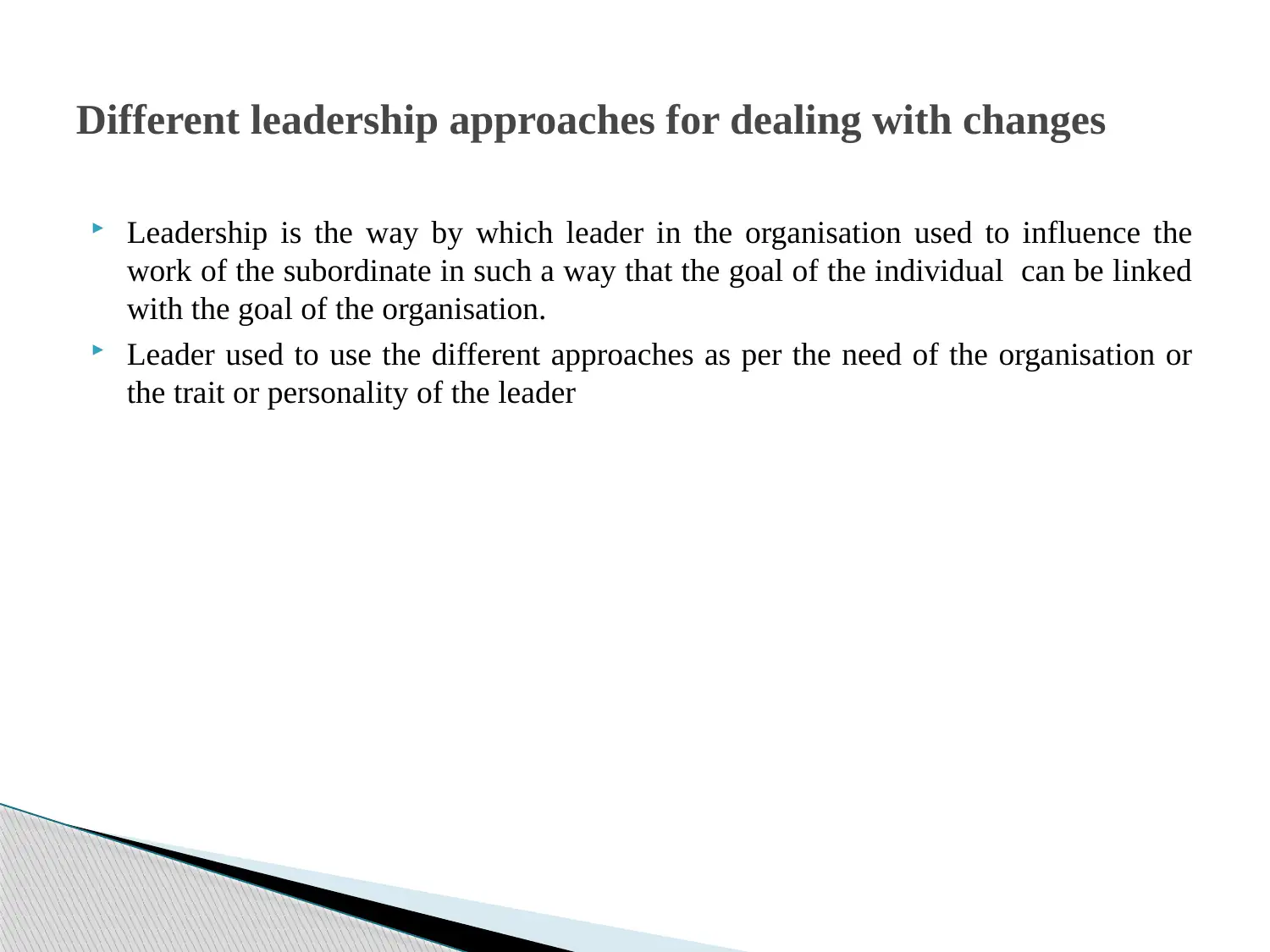
Leadership is the way by which leader in the organisation used to influence the
work of the subordinate in such a way that the goal of the individual can be linked
with the goal of the organisation.
Leader used to use the different approaches as per the need of the organisation or
the trait or personality of the leader
Different leadership approaches for dealing with changes
work of the subordinate in such a way that the goal of the individual can be linked
with the goal of the organisation.
Leader used to use the different approaches as per the need of the organisation or
the trait or personality of the leader
Different leadership approaches for dealing with changes
Paraphrase This Document
Need a fresh take? Get an instant paraphrase of this document with our AI Paraphraser
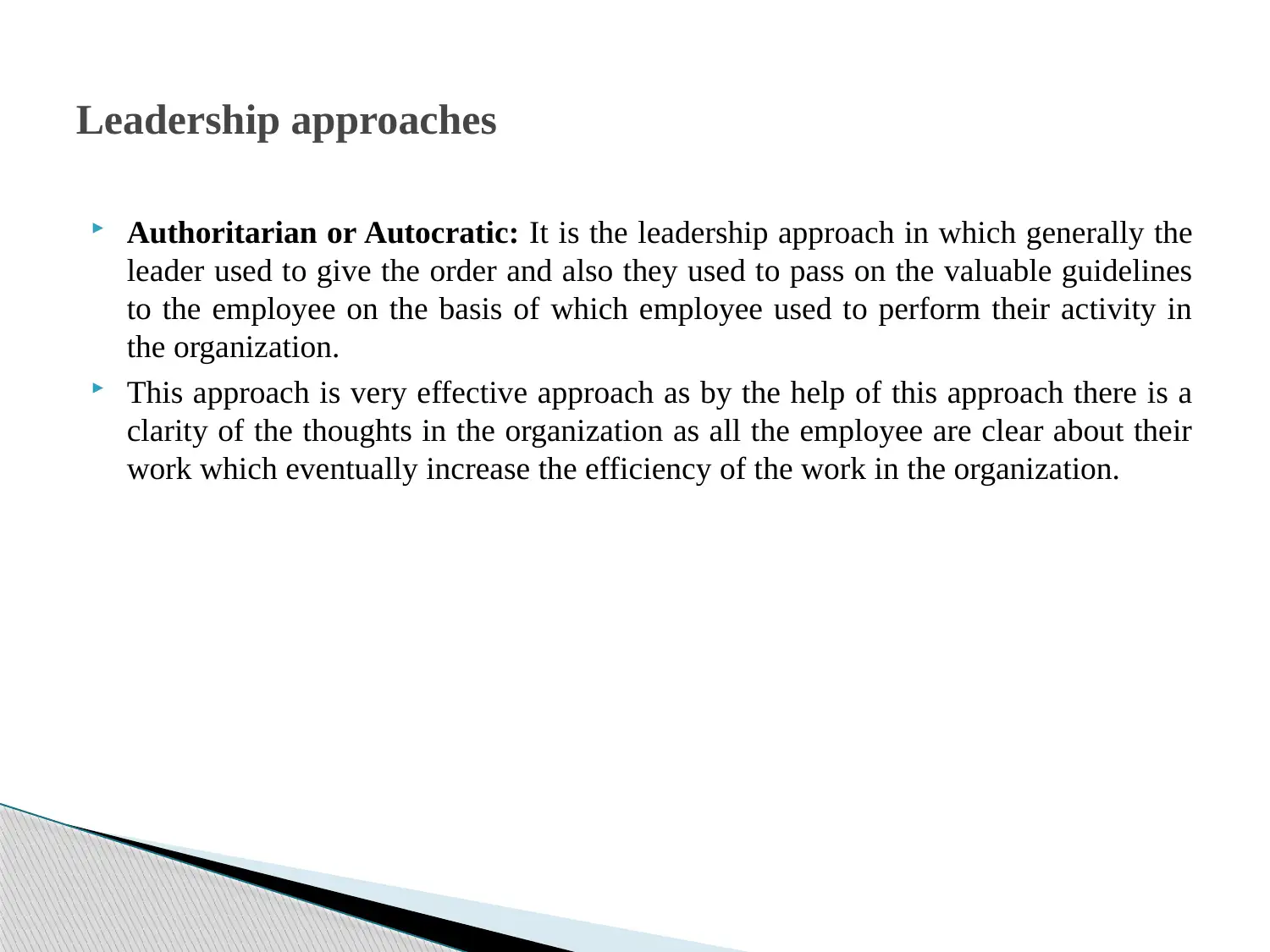
Authoritarian or Autocratic: It is the leadership approach in which generally the
leader used to give the order and also they used to pass on the valuable guidelines
to the employee on the basis of which employee used to perform their activity in
the organization.
This approach is very effective approach as by the help of this approach there is a
clarity of the thoughts in the organization as all the employee are clear about their
work which eventually increase the efficiency of the work in the organization.
Leadership approaches
leader used to give the order and also they used to pass on the valuable guidelines
to the employee on the basis of which employee used to perform their activity in
the organization.
This approach is very effective approach as by the help of this approach there is a
clarity of the thoughts in the organization as all the employee are clear about their
work which eventually increase the efficiency of the work in the organization.
Leadership approaches
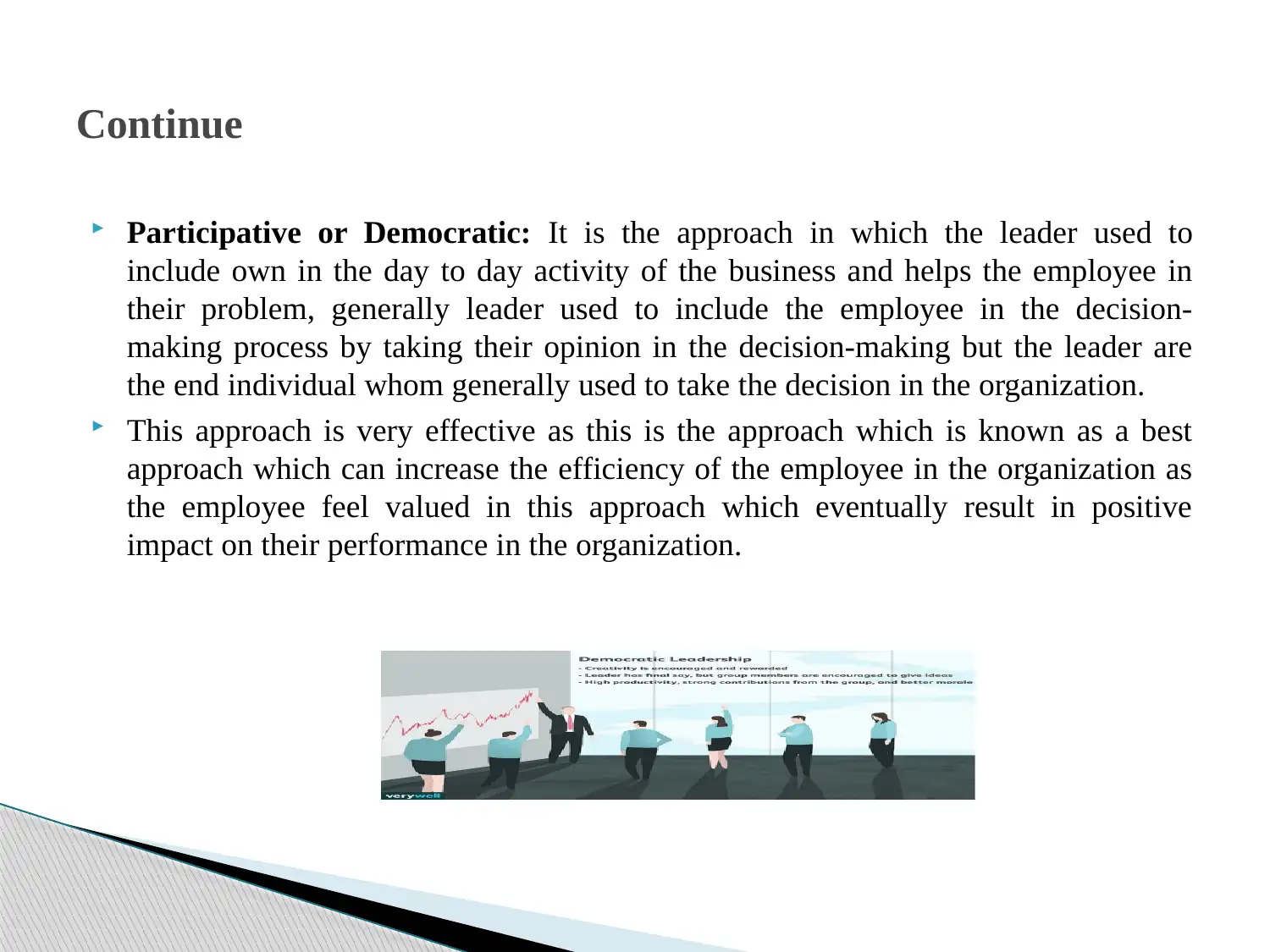
Participative or Democratic: It is the approach in which the leader used to
include own in the day to day activity of the business and helps the employee in
their problem, generally leader used to include the employee in the decision-
making process by taking their opinion in the decision-making but the leader are
the end individual whom generally used to take the decision in the organization.
This approach is very effective as this is the approach which is known as a best
approach which can increase the efficiency of the employee in the organization as
the employee feel valued in this approach which eventually result in positive
impact on their performance in the organization.
Continue
include own in the day to day activity of the business and helps the employee in
their problem, generally leader used to include the employee in the decision-
making process by taking their opinion in the decision-making but the leader are
the end individual whom generally used to take the decision in the organization.
This approach is very effective as this is the approach which is known as a best
approach which can increase the efficiency of the employee in the organization as
the employee feel valued in this approach which eventually result in positive
impact on their performance in the organization.
Continue
⊘ This is a preview!⊘
Do you want full access?
Subscribe today to unlock all pages.

Trusted by 1+ million students worldwide
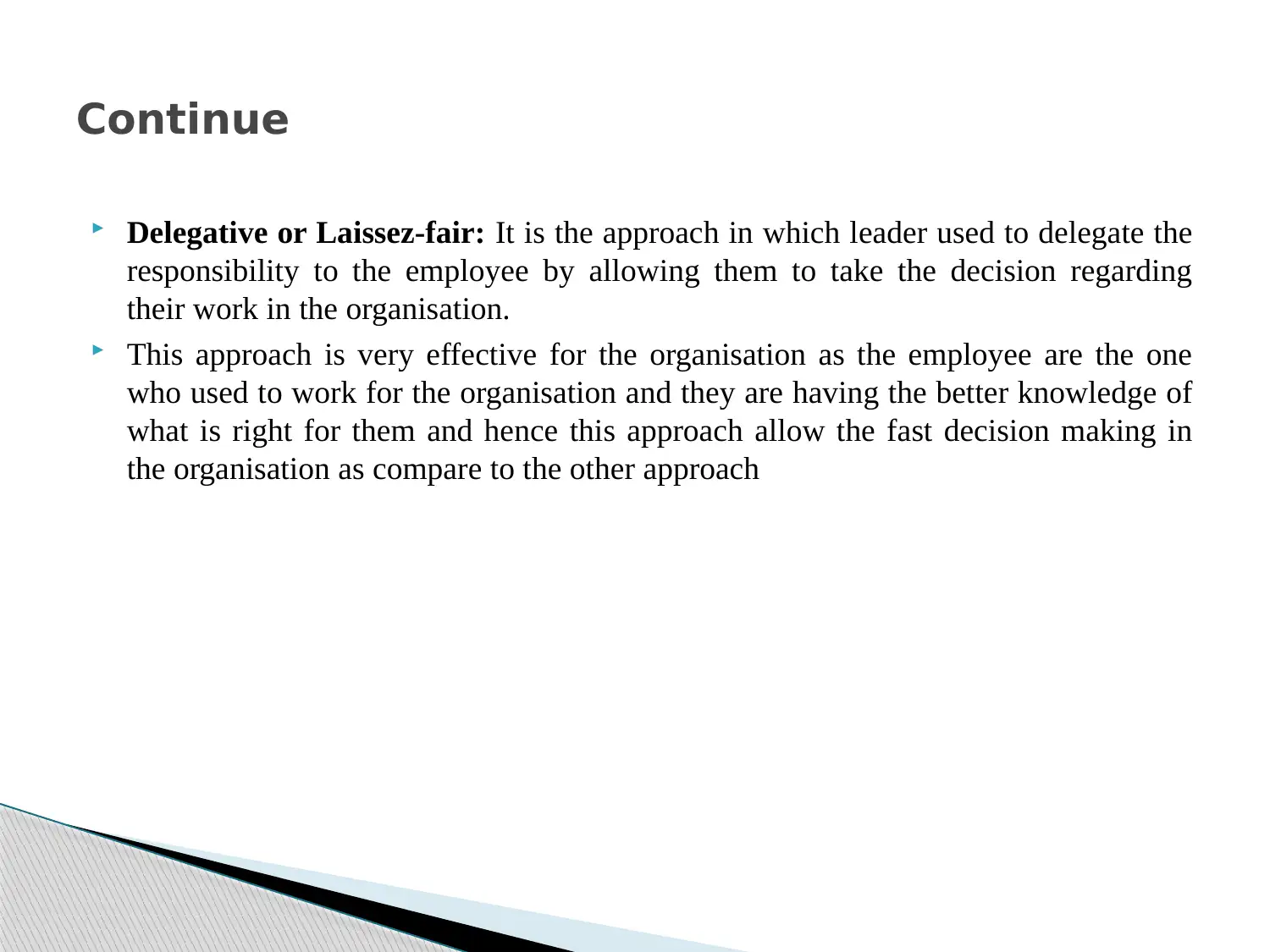
Delegative or Laissez-fair: It is the approach in which leader used to delegate the
responsibility to the employee by allowing them to take the decision regarding
their work in the organisation.
This approach is very effective for the organisation as the employee are the one
who used to work for the organisation and they are having the better knowledge of
what is right for them and hence this approach allow the fast decision making in
the organisation as compare to the other approach
Continue
responsibility to the employee by allowing them to take the decision regarding
their work in the organisation.
This approach is very effective for the organisation as the employee are the one
who used to work for the organisation and they are having the better knowledge of
what is right for them and hence this approach allow the fast decision making in
the organisation as compare to the other approach
Continue
Paraphrase This Document
Need a fresh take? Get an instant paraphrase of this document with our AI Paraphraser
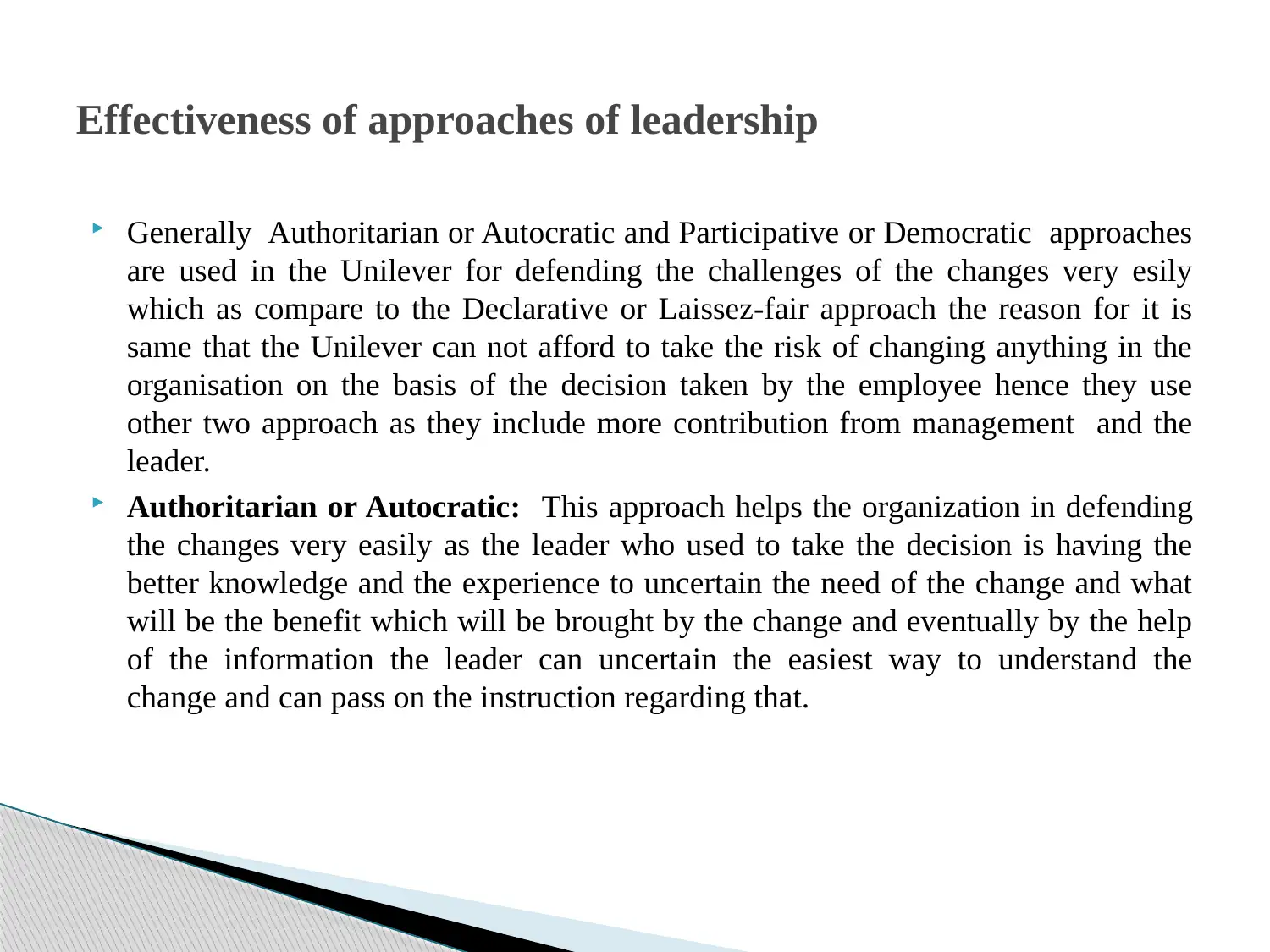
Generally Authoritarian or Autocratic and Participative or Democratic approaches
are used in the Unilever for defending the challenges of the changes very esily
which as compare to the Declarative or Laissez-fair approach the reason for it is
same that the Unilever can not afford to take the risk of changing anything in the
organisation on the basis of the decision taken by the employee hence they use
other two approach as they include more contribution from management and the
leader.
Authoritarian or Autocratic: This approach helps the organization in defending
the changes very easily as the leader who used to take the decision is having the
better knowledge and the experience to uncertain the need of the change and what
will be the benefit which will be brought by the change and eventually by the help
of the information the leader can uncertain the easiest way to understand the
change and can pass on the instruction regarding that.
Effectiveness of approaches of leadership
are used in the Unilever for defending the challenges of the changes very esily
which as compare to the Declarative or Laissez-fair approach the reason for it is
same that the Unilever can not afford to take the risk of changing anything in the
organisation on the basis of the decision taken by the employee hence they use
other two approach as they include more contribution from management and the
leader.
Authoritarian or Autocratic: This approach helps the organization in defending
the changes very easily as the leader who used to take the decision is having the
better knowledge and the experience to uncertain the need of the change and what
will be the benefit which will be brought by the change and eventually by the help
of the information the leader can uncertain the easiest way to understand the
change and can pass on the instruction regarding that.
Effectiveness of approaches of leadership
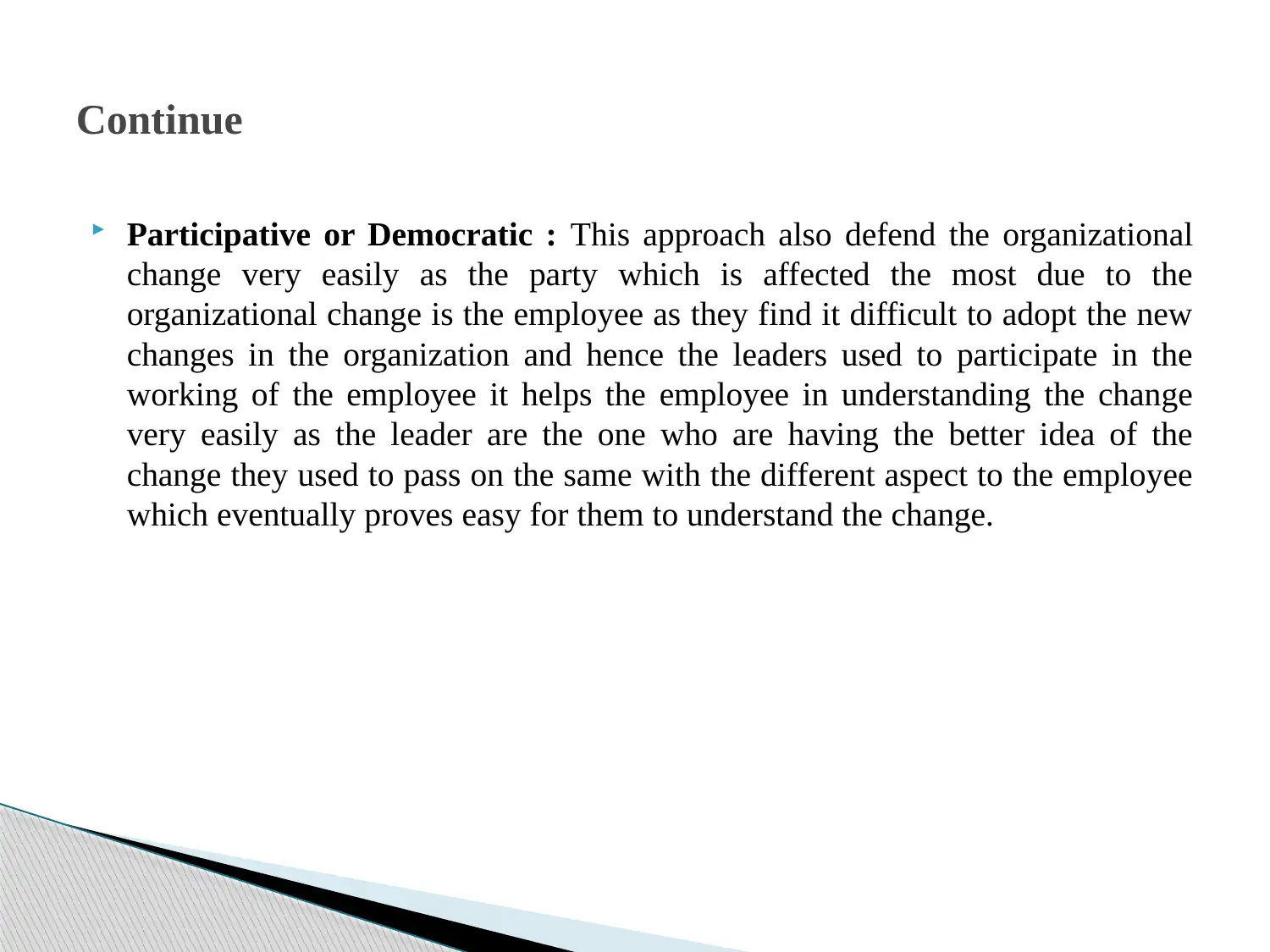
Participative or Democratic : This approach also defend the organizational
change very easily as the party which is affected the most due to the
organizational change is the employee as they find it difficult to adopt the new
changes in the organization and hence the leaders used to participate in the
working of the employee it helps the employee in understanding the change
very easily as the leader are the one who are having the better idea of the
change they used to pass on the same with the different aspect to the employee
which eventually proves easy for them to understand the change.
Continue
change very easily as the party which is affected the most due to the
organizational change is the employee as they find it difficult to adopt the new
changes in the organization and hence the leaders used to participate in the
working of the employee it helps the employee in understanding the change
very easily as the leader are the one who are having the better idea of the
change they used to pass on the same with the different aspect to the employee
which eventually proves easy for them to understand the change.
Continue
⊘ This is a preview!⊘
Do you want full access?
Subscribe today to unlock all pages.

Trusted by 1+ million students worldwide
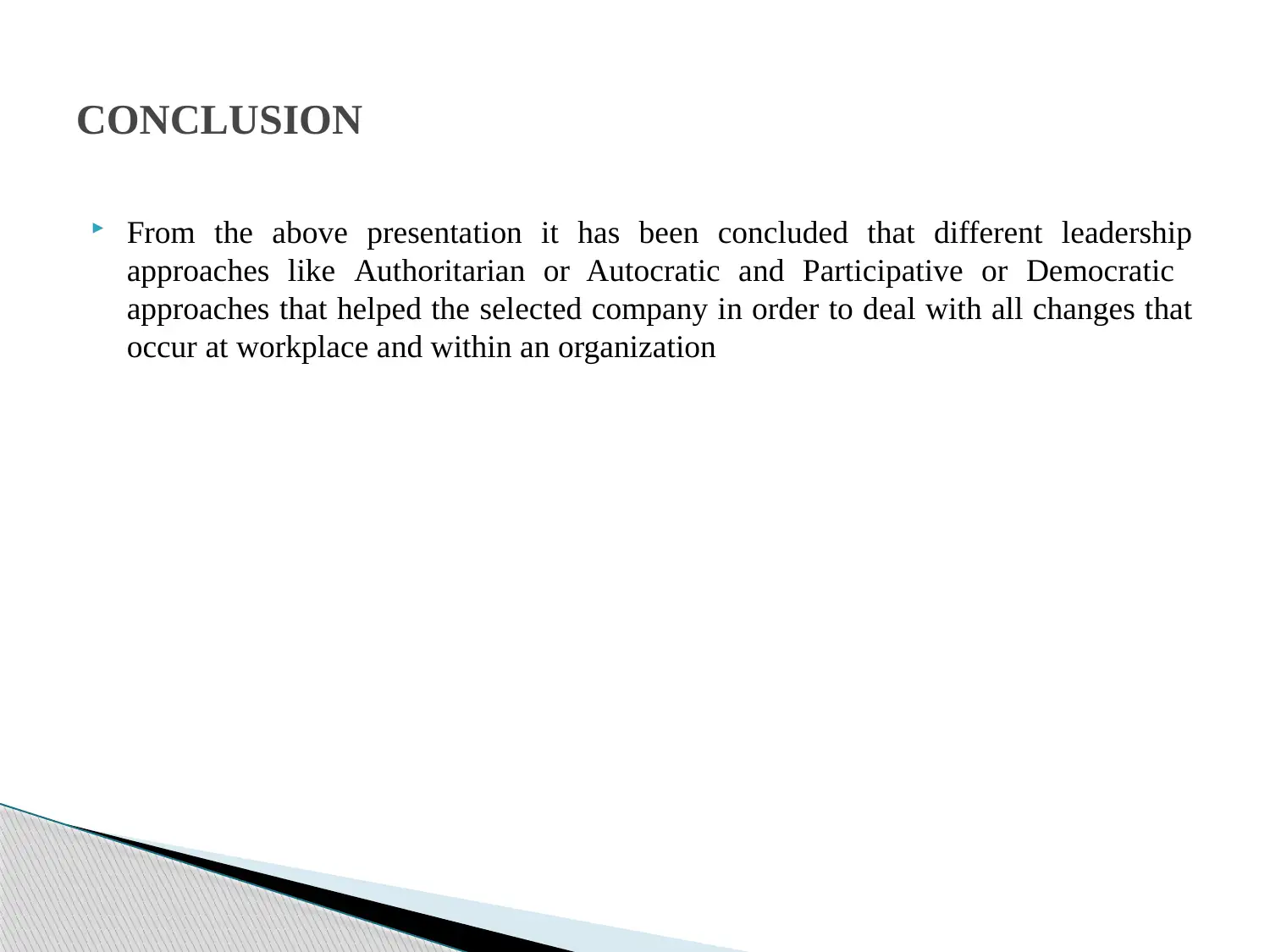
From the above presentation it has been concluded that different leadership
approaches like Authoritarian or Autocratic and Participative or Democratic
approaches that helped the selected company in order to deal with all changes that
occur at workplace and within an organization
CONCLUSION
approaches like Authoritarian or Autocratic and Participative or Democratic
approaches that helped the selected company in order to deal with all changes that
occur at workplace and within an organization
CONCLUSION
Paraphrase This Document
Need a fresh take? Get an instant paraphrase of this document with our AI Paraphraser
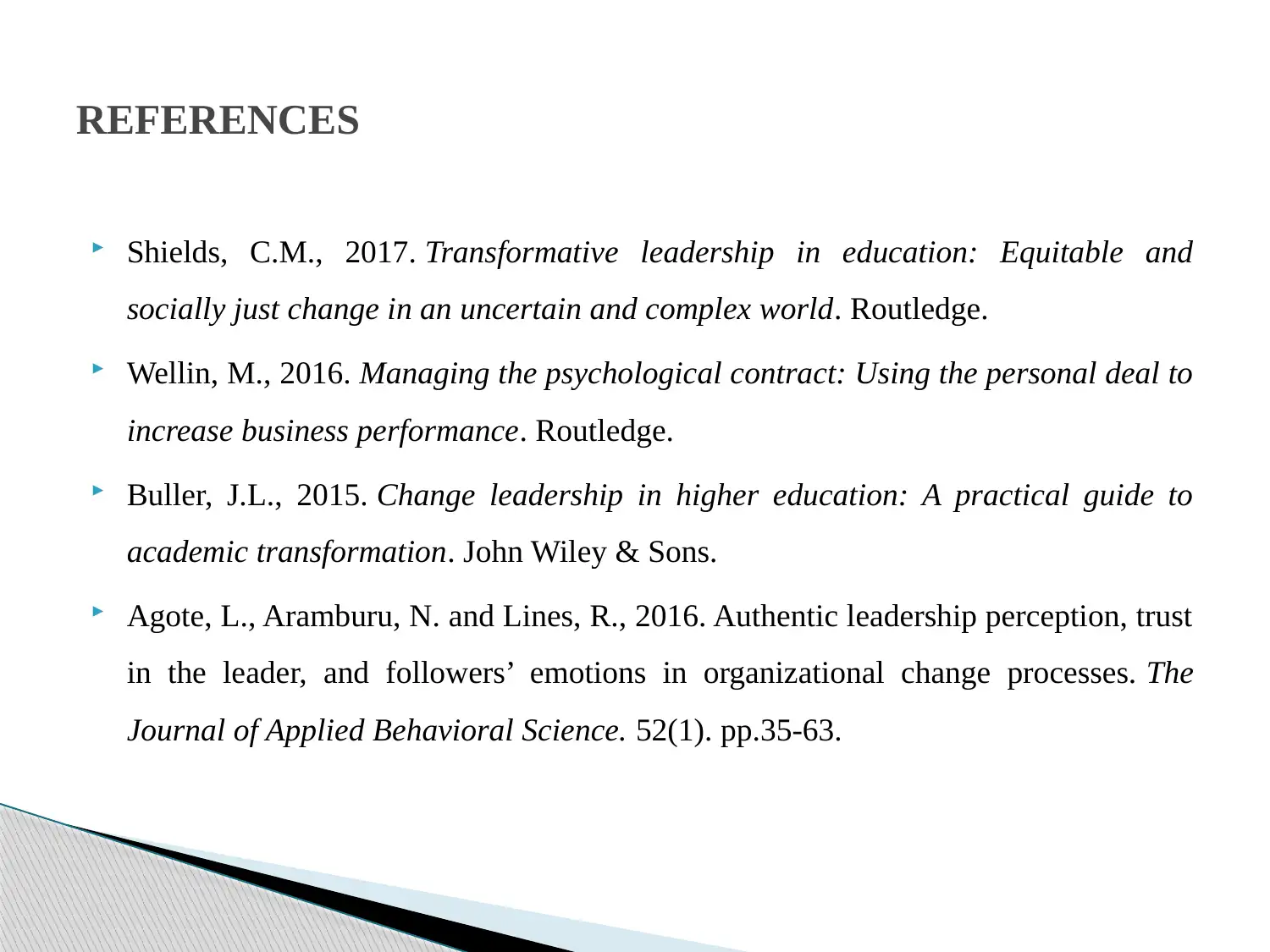
Shields, C.M., 2017. Transformative leadership in education: Equitable and
socially just change in an uncertain and complex world. Routledge.
Wellin, M., 2016. Managing the psychological contract: Using the personal deal to
increase business performance. Routledge.
Buller, J.L., 2015. Change leadership in higher education: A practical guide to
academic transformation. John Wiley & Sons.
Agote, L., Aramburu, N. and Lines, R., 2016. Authentic leadership perception, trust
in the leader, and followers’ emotions in organizational change processes. The
Journal of Applied Behavioral Science. 52(1). pp.35-63.
REFERENCES
socially just change in an uncertain and complex world. Routledge.
Wellin, M., 2016. Managing the psychological contract: Using the personal deal to
increase business performance. Routledge.
Buller, J.L., 2015. Change leadership in higher education: A practical guide to
academic transformation. John Wiley & Sons.
Agote, L., Aramburu, N. and Lines, R., 2016. Authentic leadership perception, trust
in the leader, and followers’ emotions in organizational change processes. The
Journal of Applied Behavioral Science. 52(1). pp.35-63.
REFERENCES
1 out of 11
Related Documents
Your All-in-One AI-Powered Toolkit for Academic Success.
+13062052269
info@desklib.com
Available 24*7 on WhatsApp / Email
![[object Object]](/_next/static/media/star-bottom.7253800d.svg)
Unlock your academic potential
Copyright © 2020–2025 A2Z Services. All Rights Reserved. Developed and managed by ZUCOL.




